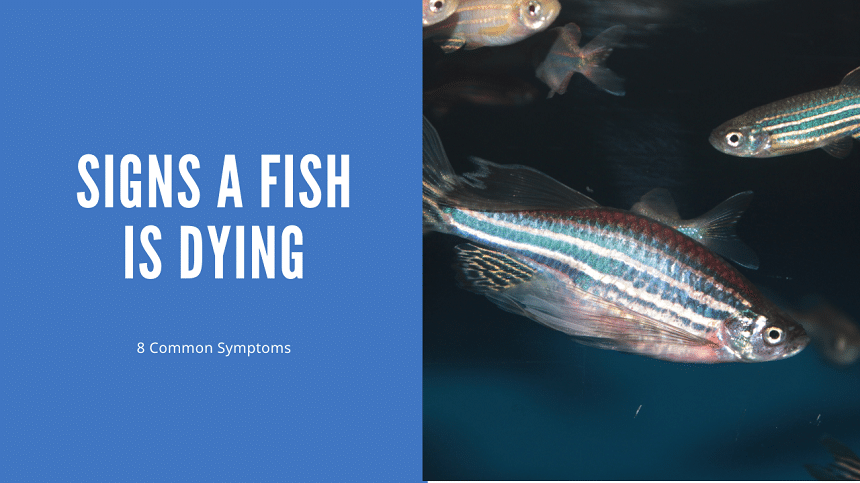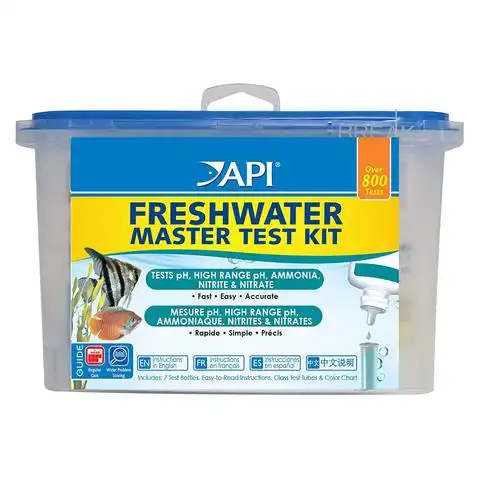Thank you for visiting! By the way… any links on this page that lead to products on Amazon and other stores/partners are affiliate links Aquarium Store Depot earns a commission if you make a purchase.
The hard truth about owning an aquarium is that you’ll eventually lose fish. Probably a good amount of them, actually.
There is a steep learning curve to fishkeeping that can only truly be mastered once you’ve, unfortunately, lost a couple of fish. Even the most experienced hobbyists lose fish and invertebrates from time to time. The mastery of the hobby comes from preventing these accidents from happening again after the first time.
One of the ways to prevent your fish from dying is knowing what a dying fish looks like and the reasons why their health declines. Let’s learn about the signs that a fish is dying.
Key Takeaways
- Losing a fish is hard, but it’s important to know what to do when that time comes.
- There are many symptoms of a dying fish, including abnormal swimming patterns, differences in physical appearance, and trouble breathing.
- Sick and dying fish are often the result of incorrect water parameters, extreme water temperature, stress, or injury. However, they may also die from old age.
Is Your Fish Dying?
If you ask this question, it’s likely too late to save your fish. A healthy fish is colorful, active, and eager to eat. A dying fish might have some obvious external symptoms like cut-up fins, abrasions, inflamed gills, or other signs of parasites. You can check out our video below on our YouTube channel. Subscribe if you like our content and follow along with our blog below. Our blog is more detailed than our video.
Some behavioral changes might include erratic swimming around the tank, laying sideways on the substrate, gasping for air at the water’s surface, or scratching against hard surfaces. Sick fish may also lose weight from a poor appetite and turn pale in body color.
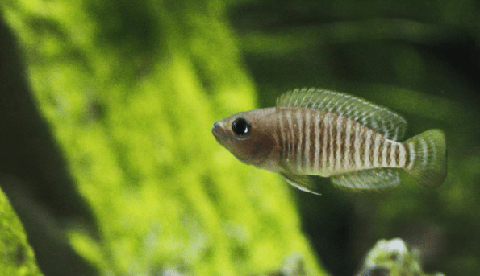
Many of these symptoms overlap with symptoms regularly displayed due to disease and illness. For example, common parasitic infections, like ich, cause the fish to scratch themselves against surfaces in the aquarium and gasp for air. Even though the fish may show these symptoms and look physically damaged, they can still be saved through relatively straightforward treatment methods.
How do you know that your fish is past the point of being saved, though?
This is a hard call to make, but it’s easy to know when your fish is on its final days either due to disease or age. That isn’t to say that you shouldn’t keep trying to save your fish until that day comes, though. But at some point, there is nothing you can do.
Usually, there will be major changes in behavior and appearance. Some of the more foretelling symptoms of imminent death include:
- staying out in the open once the fish tank lights have gone out
- staying hidden in rockwork and decorations during the day
- pale and tattered appearance
- getting stuck in intake flows
- getting picked on by other fish and invertebrates
How To Tell Your Fish Is Dead
It can be hard to tell when your fish is dead for certain. When they’re dying, it is common for fish to lay on the substrate motionless. Their breathing can be fast and shallow or slow and deep.
A dead fish will be completely motionless. They may have stiff fins. They may have sunken-in and cloudy eyes. Their body may have started to deteriorate. If you have invertebrates in the tank, they may have even started to break down the body.
If you’re unsure about whether or not your fish is dead, try to remove it with a fish net. If your fish is dead, then it will most likely be stiff and won’t put up a fight. If your fish is dying, it may be flexible and try to evade being caught.
Do Fish Float or Sink When They Die?
You’ve probably seen the cartoon of the dead fish floating upside with crosses over its eyes. Its tongue might have even been sticking out.
No, this is not what happens!
When your fish die, generally, they sink. Oftentimes you’ll turn on your aquarium light to find your sick fish nowhere in sight. Once you start checking between rocks and decorations, you’ll often find the dead fish laying on its side on the substrate. If you have invertebrates in the tank, it’s possible that they will have started to eat the fish.
It is strongly recommended to remove the dead fish as soon as possible to prevent problems with water quality.
Signs That A Fish Is Dying, Dead, Or Sick
So what signs should you look out for in your fish? We’ve listed some of the less common symptoms of a dying, dead, or sick fish, but we haven’t listed the ones you’re most likely to see.
Remember, these can result from a disease or illness and do not always indicate imminent death.
Swimming Sideways Or Upside Down
Swimming sideways or upside down is a very worrying symptom. This behavior can display itself in several ways.
One, your fish may literally be swimming upside down or sideways. This is usually indicative of poor water quality but is also one of the leading symptoms of both swim bladder disease and fin rot (video source).
Another way this symptom presents itself is your fish rapidly swimming up and down or side to side across the aquarium. This motion can be so fast that they look like they’re swimming upside down or sideways and can even lead to the fish jumping out of the aquarium.
White Spots On Body
A healthy fish has bright colors without any discoloration. A fish with white spots on its body is most likely suffering from parasitic, bacterial, or fungal infections. The leading cause for white spots to appear on a sick fish is ich, also known as white spot disease. However, velvet and various flukes can also present as this symptom.
Loss Of Appetite
Loss of appetite is seen in nearly all sick fish. However, as long as your fish eats, there is a good chance of recovery. It’s once your fish stops eating that it becomes difficult to keep them strong and bolster their immune system.
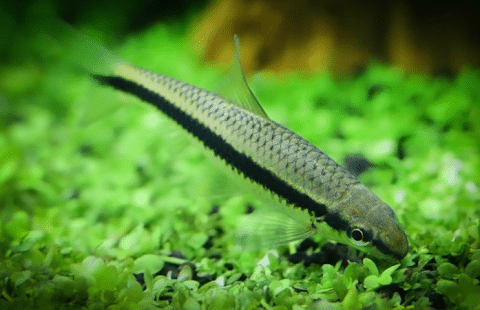
This symptom can be difficult to treat. Hobbyists recommend soaking food in garlic to entice appetite as well as for garlic’s natural healing properties.
Gasping For Air On The Water Surface
Gasping for air is a sure sign your fish tank water is poor quality. This is your fish’s attempt to breathe fresh air and get away from harmful toxins. This could also mean that your fish’s gills are being affected either by parasites or bacterial infections.
Unless your fish has a labyrinth organ, like betta fish or gourami, then it will not be able to breathe at the surface of the water.
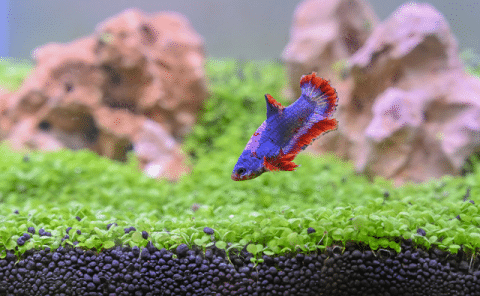
Swollen Or Distended Belly
Out of all of these symptoms, a distended belly is probably the easiest to diagnose. A swollen belly can be a sign of constipation, which is easy to fix. It can also be a sign of swim bladder disease or dropsy, which are more challenging to fix but easy to diagnose.
Gills Stop Moving
This symptom is often paired with sick fish gasping for air at the water’s surface. The most common reasons your fish’s breathing is affected can be due to parasites and other infections.
Breathing can also become difficult when exposed to poor water quality or other chemicals and toxins in the water.
Redness On Body
Redness, swelling, and inflammation of the body can be primary or secondary symptoms. Primary symptoms can be due to cuts and scrapes that your fish has received. Be mindful that redness can also indicate an infection in these areas.
Secondary redness could be caused by parasites and related infections as well. Swelling and inflammation could even be a mix of a parasitic infection, your fish trying to scrape the parasites off its body, and infection.
Why Is Your Fish Dying?
Now that you can tell that your fish is dying, you need to find out why. Most fish species in the aquarium trade are hardy and can adapt to unfavorable conditions and even survive some diseases without treatment.
Still, the most common reasons you might be dealing with a dying fish are:
- water quality issues
- water temperature
- stress
- injuries
Also, consider how long you’ve had your fish. Most aquarium fish available at the pet store are at least 6 months to a year old. Tropical fish can live for surprisingly long times, with most species having the potential to live up to a decade. However, if you’ve had your fish a long time and nothing seems to be wrong with it, then your fish might be dying of old age.
At this point, there’s nothing you can do for your fish but give it the best remaining days of its life.
Common Causes
Here are some of the most common reasons why your fish might be sick or dying. Keep in mind that many of these issues overlap with one another, along with the symptoms caused.
Water Quality Issues
There are many reasons why an otherwise healthy fish may die from water quality issues. One of the most obvious reasons for sudden fish death is adding a ton of fish to a brand-new, uncycled aquarium. This means that fish create ammonia through waste and respiration, which cannot be processed due to the absence of beneficial bacteria that make water conditions safe. As a result, the fish often succumb to ammonia or nitrite poisoning.
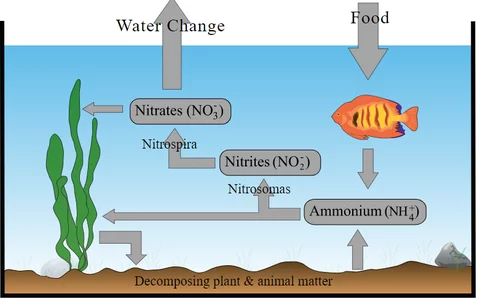
Unfortunately, many new fish keeper enthusiasts make this mistake as they don’t understand the aquarium needs to go through the nitrogen cycle before adding fish. In some cases, the fish tank is cycled, but too many fish have been added at once, leading to overloading the current population of beneficial bacteria. Other times, a water conditioner isn’t used, leading to death from chlorine and chloramine.
Even in a mature tank, water quality issues cause dead fish. Ammonia and nitrite poisoning are still very real threats for cycled aquariums if tank maintenance isn’t regular. This is especially true if leftover food and waste are left to rot at the bottom of the aquarium and if the filtration system is insufficient.
An easy fix to water quality issues is performing a weekly or biweekly 10-25% water change. At the same time, siphon the substrate with an aquarium vacuum to remove any unprocessed waste. Regularly use an aquarium test kit to check water chemistry.
However, one of the more challenging water parameters to keep in check is pH. This is because pH is a very sensitive parameter due to it being calculated on a logarithmic scale. Sudden changes exceeding more than a daily increase or decrease of .50 can cause a fish’s body to stop functioning correctly. This can lead to a very fast and painful death.
Best Aquarium Test Kit For Freshwater
With all the essentials and accurate testing, this test kit is the best one to get you started
Another parameter difficult to gauge is dissolved oxygen. Fish need oxygen to breathe. As they breathe, they also release carbon dioxide into the water. This is why aquarium water surface agitation and overall water circulation are so important.
Water surface agitation helps facilitate gas exchange, meaning bringing in new oxygen and releasing used carbon dioxide. Water circulation helps carry both oxygen and carbon dioxide throughout the water column to prevent dead zones. If fish cannot breathe, then they can suffocate.
Water surface agitation and circulation can be increased through the use of an air stone, pumps, increased filtration, or more regular tank maintenance.
Water Temperature
If water quality is correct, then you still need to worry about water temperature. Aquarium fish are very adaptable to both higher and lower temperatures, but sudden fluctuations and extreme temperatures can cause your fish to go into shock.
The reality is that too high of a water temperature can cause your fish to cook, while a low temperature can cause your fish to slip into unconsciousness and eventual death. To prevent this from happening, an aquarium heater should always be used for stability for tropical fish and cold weather environments. As aquarium heaters are very prone to malfunctioning, some fishkeeper hobbyists replace their equipment yearly.
At the very least, the temperature should be checked once a day.
Stress
Even if nothing is outwardly wrong with your fish’s body, it may still succumb to stress. There are many reasons why a fish could become stressed. This could be due to incorrect water parameters, incompatible tank mates, lack of space or hiding spots, or disease and illness.
Even though fish might not die due to water parameters, they’ll still become stressed when conditions aren’t right or when they’re fluctuating. The effects of consistently low amounts of ammonia or nitrite can start to affect fish long-term, leading to early death.
Fish compatibility is often an overlooked reason for a stressed fish. However, if your fish feels like it needs to fight for its life every day, then it can become injured or malnourished due to competition. The same is true if keeping a schooling fish that isn’t kept with enough related species.
Keeping a big fish in a small tank can cause the fish to become stunted. This is a physical stress that can start to affect bodily functions over time. A lack of hiding spots can also make your fish feel like it needs to be in constant flight mode, which can cause stress on the body.
Lastly, stress from having a disease can exacerbate the symptoms of the illness. This is why it’s strongly recommended to move fish to a quarantine tank that can be fully controlled with minimal lighting and other stressors.
Injuries
Just like you, getting injured causes extreme stress on a fish’s body. On top of that, many of the medications used to treat injuries can cause even greater stress. Oftentimes, this stress is less than what would be caused by staying untreated.
Still, aquarium fish are very resilient and will quickly bounce back from an injury if given proper care. Fish can happily live with one eye if need be!
Action Steps
Now that you know why your fish is dying, how can you save them? Like any other aquarium problem, you need to treat the cause at the source. The best ways to give proper treatment to a sick fish are through water changes, medications, and lastly, euthanization.
Water Changes
Water changes are one of the best ways to treat water and sick fish. Even if your fish isn’t suffering from poor water quality, introducing new water through water changes can help bolster your fish’s immune system and get them on the right track to recovery.
As mentioned before, regular tank maintenance should include weekly or biweekly 10-25% water changes. Some medications and disease treatments may require more frequent water changes, like one ich treatment method that requires daily water changes.
Make sure that the source water being used is high-quality, meaning that there is no ammonia or nitrite with minimal nitrates.
Medications
Medications are readily available for almost any parasitic, bacterial, or fungal infection found in the aquarium. Medications are not always necessary for the recovery of the fish but can help aid in extreme cases. A gentle and indirect medication, like aquarium salt, can help make the recovery process smoother.
Keep in mind that many medications are harsh on your fish’s immune system. If your fish is dying, heavy medications may ultimately cause the death of your fish. That being said, the appropriate treatment for some diseases is only through medication.
Conclusion
Sadly, losing fish is part of the hobby. It is pretty easy to tell when a fish is dying or not, but it can be harder to tell if they’re past the point of recovery. A few signs of a sick and dying fish are if they have trouble breathing, erratic movements, pale body color, or loss of appetite. These symptoms can be a result of incorrect water parameters, water temperature, stress, or injuries. Also, keep in mind that fish die of old age, too.
Luckily, there are many medications available that can treat sick fish. But if you find that your fish is suffering, it may be time to humanely euthanize them.
- About the Author
- Latest Posts
I’m thrilled that you found Aquarium Store Depot! Here you’ll find information on fish, aquariums, and all things aquatics related. I’m a hobbyist (being doing this since I was 11) and here to help other hobbyists thrive with their aquariums! I adhere to a high quality Editorial Process and Review products with real life field usage and practical analysis.

